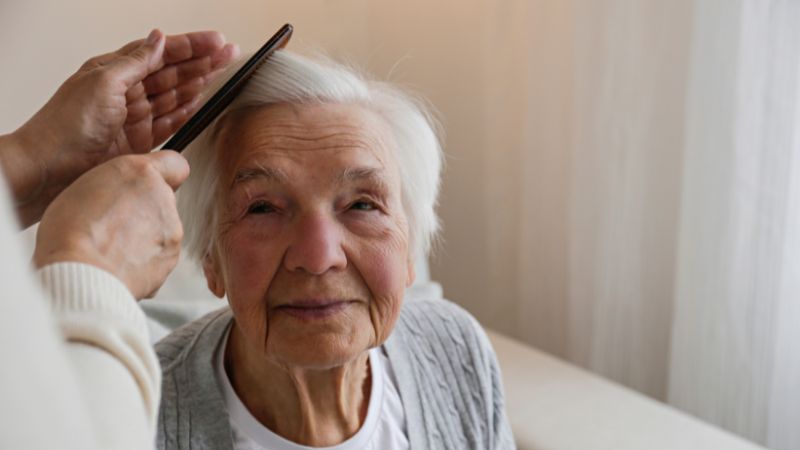 Seniors thrive in a supportive environment. Three types of professionals are qualified to ensure the wellbeing of the elderly, whether at home, in an assisted living facility or in a nursing home. These are the GNA, CNA and HHA. Several differences exist between these helpful elder care workers.
Seniors thrive in a supportive environment. Three types of professionals are qualified to ensure the wellbeing of the elderly, whether at home, in an assisted living facility or in a nursing home. These are the GNA, CNA and HHA. Several differences exist between these helpful elder care workers.
How are these professions described?
The Geriatric Nursing Assistant (GNA) is a skilled professional who is trained to assist seniors with the activities of daily living, including bathing, dressing and eating; they also take vital signs. The GNA works under the supervision of a registered nurse (RN). The Certified Nursing Assistant (CNA) similarly provides support to elderly patients. The CNA assists seniors with the activities of daily living, such as grooming, toileting and mobility; they are trained to take vital signs, too. The CNA works under the supervision of an RN. The Home Health Aide (HHA) offers basic healthcare to elderly care recipients. Typical responsibilities include changing soiled bed linens, emptying bedpans and assisting with dressing, grooming and bathing. The HHA may also shop for groceries, prepare nutrient-rich meals and provide transportation.
What are the different areas in which they work?
The GNA has countless opportunities when it comes to work locations. These individuals may work in assisted living facilities, hospitals, adult day care centers, home care agencies and physician’s offices. Long-term care facilities, like nursing homes, also frequently employ GNAs. The CNA also has a range of work opportunities. Several doctor’s offices, hospitals, adult day care centers and home care agencies employ CNAs. Similar to GNAs, CNAs may also work in long-term care environments, like assisted living and nursing homes. Adult day care centers, retirement communities, group homes for seniors and assisted living facilities frequently hire HHAs to assist with tending to the daily needs of their senior residents. As employees of home care agencies, HHAs also commonly work in senior’s homes.
What are the differences in training?
GNAs are graduates of an approved nursing assistant program. Upon completing their education, these individuals are certified as nursing assistants by the board of nursing. In order to become a qualified GNA, the individual must also take a state exam. Similar to the GNA, the CNA completes training at an approved nursing assistant program. The board of nursing also certifies the individual as a nursing assistant. Unlike the GNA, the CNA is not required under state law to pass a state exam. HHAs are not required to possess any formal training in order to work in the field. A high school diploma is sufficient for this profession. Normally, however, the HHA receives hands-on training and passes a competency exam before being hired by a home care agency.
How do services vary?
In nursing homes, doctors and nurses are often at the top of the hierarchy. However, without the personal attention that GNAs provide on a daily basis, senior residents are unlikely to receive the one-on-one care they need to recover. GNAs are instrumental in providing everyday support. Nursing homes can also be large and impersonal facilities; but GNAs take the time to provide companionship to senior residents, helping them stay as happy as possible under the circumstances. GNAs are central to ensuring nursing homes run smoothly and efficiently. Medication management is a large part of senior’s health and wellbeing. While GNAs are not qualified to administer medications (which is the nurse’s responsibility), they do monitor their care recipients, watching for any medication side effects and reporting them to the nurse. CNAs who receive proper training are qualified to provide skilled care, like drawing blood.
The extent of training the CNA receives determines the level of healthcare support he or she is allowed to provide to senior care recipients. Within limits, a qualified CNA is capable of providing advanced medical care.
Despite having a basic education, HHAs are still integral to the successful functioning of an elderly care recipient. These professionals offer constant supervision and invaluable companionship, services that reassure families that their elderly loved one is well looked after, especially if the senior lives alone. Commonly, the services of two or more care providers are combined. For instance, the GNA or CNA will provide advanced medical care after a senior is released from the hospital. The HHA helps the senior at home with general household chores, meal preparation and mobility. While the primary difference between a GNA and a CNA is the type of employer for which the professional may work, HHAs are qualified to work in a senior’s home. Home care agencies are staffed with trained HHAs who enhance the daily lives of the seniors in their care.

As seniors grow older, they are more likely to need help with what many people take for granted. Older individuals’ strength deteriorates, or they may experience cognitive decline. Both scenarios warrant extra support from elder care providers, especially if the senior wishes to remain at home. When your loved one chooses to age in place, support their decision by hiring in-home senior care from Assisting Hands Home Care. We are a licensed, bonded and insured home care agency that is dedicated to helping seniors stay as independent as possible in the comfort of home. Our vetted and qualified caregivers perform a range of services that assist seniors with daily functioning. We provide transportation to doctor’s offices, shop for groceries, provide companionship and assist with the activities of daily living, like bathing, grooming, light housekeeping and meal preparation.
Assisting Hands Home Care services are non-medical in nature. However, we do provide comprehensive elder care services, such as post-operative care, dementia and Alzheimer’s care, respite care, 24-hour home care and live-in care. Our care programs are flexible and may be updated at any time. Families with seniors living in the surrounding communities of Batavia, Aurora, St Charles and Bartlett, Illinois are encouraged to consult with our friendly team at Assisting Hands Home Care. We offer a complimentary in-home assessment to get started with our reputable, dependable home care services.















